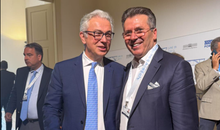
 Flash News
Flash News
BIRN: The Turkey-Albania agreement could strengthen Erdogan's propaganda in the Albanian media

Albania and Turkey signed an agreement on "media and communication" on Tuesday during the visit of Albanian Prime Minister Edi Rama to Turkey. The Media Cooperation Protocol was signed by the director of the Albanian Public Television, RTSH, Alfred Peza, and by Zahid Sobaci, the director of the Turkish public television, TRT.
"This protocol aims to further improve the cooperation between the two televisions. Specifically, participants will gain the right to broadcast radio and television programs free of charge or with a fee for a certain license period, or exchange programs free of charge" , says a RTSH press release.
"Both TV stations... will also participate, mutually and according to their capabilities and capabilities, in radio and television festivals, competitions and cultural shows in each other's countries," he added.
But Abdullah Sencer Gozubenli, an expert on Balkan politics from Abo Akademi University in Finland, told BIRN that the deal could result in Turkish President Recep Tayyip Erdogan's propaganda being exported through TRT to Albania.
" We have seen this before in North Macedonia when a TV channel, MRT 4, broadcast TRT shows, especially news about world politics. This allowed the (ethnic) Turks of North Macedonia to see the world through the lens of Erdogan's Islamic political ideology. This means a direct export of political ideology" , said Gozubenli.
Gozubenli added that the cooperation may seem normal between two common public broadcasters of two countries that have close relations, but the Turkish-Albanian case is different.
" Both public broadcasters, especially Turkey's TRT, are not ordinary public broadcasters. Instead, they are propaganda tools of the two governments ," said Gozubenli.
Albania's RTSH has faced a lot of criticism, starting with the way its head Alfred Peza, a former deputy of the ruling Socialist Party, was appointed, and for its objectivity and impartiality. RTSH is widely seen as the mouthpiece of the Rama government.
The OSCE/ODHIR report on local elections in Albania in 2019 raised such concerns. "RTSH remains partially dependent on state funding. Dependence on the state budget and the politicization of RTSH management raise concerns about the impartiality of the public broadcaster", the report states.
Turkey's TRT has faced similar criticism for a lack of impartiality. "TRT is a propaganda tool that has been instrumentalized by an Islamic regime led by Erdogan in which media freedoms suffer greatly," said Gozubenli.
TRT has become an important tool for Erdogan during his 22-year rule in Turkey, at home and abroad. Currently, it broadcasts in several languages, including Bosnian, Croatian, Serbian, Albanian, Macedonian and Bulgarian. In 2022, TRT launched another branch called TRT Balkan which focuses on the region in regional languages as well as English.
Before the agreement with Albania, Turkey signed a similar agreement with Serbia in 2022.
Blerjana Bino, from Safe Journalist Albania, said that there is a lack of transparency about the agreement with Turkey and it is not clear what the benefit will be for the public.
"The statute of RTSH determines... that the Governing Council must approve the development strategy of RTSH and the relations of RTSH with third parties inside and outside the country", emphasized Bino. "It is not clear whether this cooperation agreement has been approved by the RTSH Governing Council" , Bino told BIRN.
She agreed on the risk of "strengthening propaganda or strategic communication for political and geopolitical purposes of foreign actors, such as Turkey."
"The main issue is what kind of products will be sent to Albania and what will be their content. There are major concerns that they will be politically motivated programs. Societies in the Balkans, especially Muslims, are being polarized as for or against Erdogan, and in this situation an important 'Erdoganist' apparatus comes into play", underlined Gozubenli.
In 2023, Albania was ranked 96th in the Press Freedom Index compiled by Reporters Without Borders, RSF. Turkey was in 165th place.
"Authoritarianism is gaining ground in Turkey, challenging media pluralism. All possible means are used to undermine critics," RSF said.
In its latest report on Albania's progress towards EU membership, the European Commission said that "no progress" had been made on media freedom. Reporter.al
Latest news


Not only the body, swimming also helps the brain
2025-07-05 21:02:49
"Be careful with the water", Alimehmeti warns about the health risks of summer
2025-07-05 20:39:10
PSG beats Bayern Munich 2-0, advances to Club World Cup semifinals
2025-07-05 20:19:38

Two vehicles collide on the Elbasan-Peqin axis, drivers injured
2025-07-05 19:26:29

What does Zelenskyy have more than Zegjineja?
2025-07-05 18:45:26

Fiscal peace, but at a cost
2025-07-05 18:00:10
'Bankers' tax evasion, Chinese CEO and former director jailed
2025-07-05 17:39:21
Kyle Walker joins English club on two-year deal
2025-07-05 17:20:24
Two cars collide on the Saranda-Delvina axis, 4 injured
2025-07-05 17:05:29
Touching gesture! Liverpool will pay Jota's family's salary until 2027
2025-07-05 16:45:18
The zodiac signs that cheat most often
2025-07-05 16:25:53

"I asked for the dismissals", Dredha tries to soften Rama's 'blow' in Vlora
2025-07-05 15:48:49
Bomb threat in Parliament, prosecutor: It was a lie
2025-07-05 15:22:28

Bardhi: The recount revealed how greedy Zeqine Balluku is in stealing
2025-07-05 14:44:29
Knife wound on the secondary road Tirana-Durrës, perpetrator sought
2025-07-05 14:37:54
Tears and pain, Diogo Jota is escorted to his final home
2025-07-05 14:21:34
Success starts with yourself! Simple ways to invest in personal development
2025-07-05 13:58:50
Unlicensed firearms found in apartment, 50-year-old arrested in Lushnje
2025-07-05 13:43:11

Tirana Court remands Skerdi Sina to prison
2025-07-05 12:59:34
Cocaine laboratory in Greece, here are the Albanians arrested and wanted
2025-07-05 12:40:16
Directed Justice/Vangjeli: SPAK does not investigate any scandal involving Rama
2025-07-05 12:22:03

Bomb alert, Police remove MPs and media from Kosovo Parliament building
2025-07-05 11:48:16
"The will of the people" and the irony of ordered resignations
2025-07-05 11:32:05
Summer drowning risk: How to enjoy the water without risking your life
2025-07-05 11:20:27
Fire situation in the country, 16 fires reported in 24 hours, 4 still active
2025-07-05 11:07:04
Car hits pedestrian at white lines, injured in serious condition in Vlora
2025-07-05 10:59:58
Mosquito-borne diseases are a growing problem in Europe
2025-07-05 10:44:13



One of Sweden's most dangerous and wanted criminals arrested in Turkey
2025-07-05 09:38:29
Foreign exchange/ How much foreign currencies are bought and sold today
2025-07-05 09:18:38

"Don't be influenced by the opinions of others", today's horoscope
2025-07-05 08:40:50

Morning Post/ In 2 lines: What mattered yesterday in Albania
2025-07-05 08:02:07

Trump says he's ready to raise tariffs to 70% on some countries
2025-07-04 22:35:52
Tre shenjat e zodiakut që do ‘pasurohen’ në Korrik
2025-07-04 22:05:09
Gaza War: Hamas Accepts US Proposal for 60-Day Ceasefire
2025-07-04 21:50:10
Autocracy in Albania, Fuga: Governance has gotten out of control
2025-07-04 21:40:51
Meta: Agriculture on credit, the new fraud!
2025-07-04 21:26:39




Vote recount in Durrës ends without changes
2025-07-04 20:12:54
Gas station explodes in Rome, 25 injured (VIDEO)
2025-07-04 20:00:20

These afternoon habits often sabotage weight loss
2025-07-04 19:39:28
Former Arsenal player Thomas Partey accused of rape
2025-07-04 19:24:21
Shepherd disappears without a trace in Delvina
2025-07-04 19:14:31

Bardho gave Zegjine's mandate/Braho: Unfair! It violates the electoral system
2025-07-04 19:01:08


Rapid developments in the Sultanates!
2025-07-04 18:00:06



Italy tightens rules for skateboard traffic
2025-07-04 17:20:18

Unusual for the time, dense fog covers the coast of Vlora
2025-07-04 16:48:01


Accident on the Shkodra-Lezhë axis, one dead and 3 injured
2025-07-04 16:14:19
Albania with fewer requests for asylum and Albanian citizenship in 2024
2025-07-04 16:06:57

Albania last for quality of life, DP: Technical government is the solution!
2025-07-04 15:42:30
Nico Williams says "No" to Barcelona, signs with Athletic Club until 2035
2025-07-04 15:33:35
Fires in the country, four fires are still active, what is the situation?
2025-07-04 15:24:20

Summer brings big changes for these 4 zodiac signs
2025-07-04 15:00:04
Osmani: MPs need to agree to a secret ballot for the Speaker of Parliament
2025-07-04 14:51:09
Serious accident on the Peqin-Elbasan axis, two injured
2025-07-04 14:37:56

GJKKO leaves in force the security measure for the head of the KPP
2025-07-04 13:58:17
Who will replace Ilir Meta and take over the leadership of the PL?
2025-07-04 13:50:36
Berisha: Dismissal of directors in Vlora, another act of 'scapegoats'
2025-07-04 13:41:46




Librazhd/ In a serious psychological state, the young man consumes pesticides
2025-07-04 13:05:07


Weapons trafficked from Kosovo to Albania, two arrested, 8 pistols seized
2025-07-04 12:33:28
Konsumimi i tepërt i çokollatës, ja cilat janë dëmet që shkakton në organizëm
2025-07-04 12:23:35

Fires in the country, 21 fires in the last 24 hours, 4 still active
2025-07-04 12:00:19
WB calls for debt transparency: Albania to publish details of every loan
2025-07-04 11:50:05
